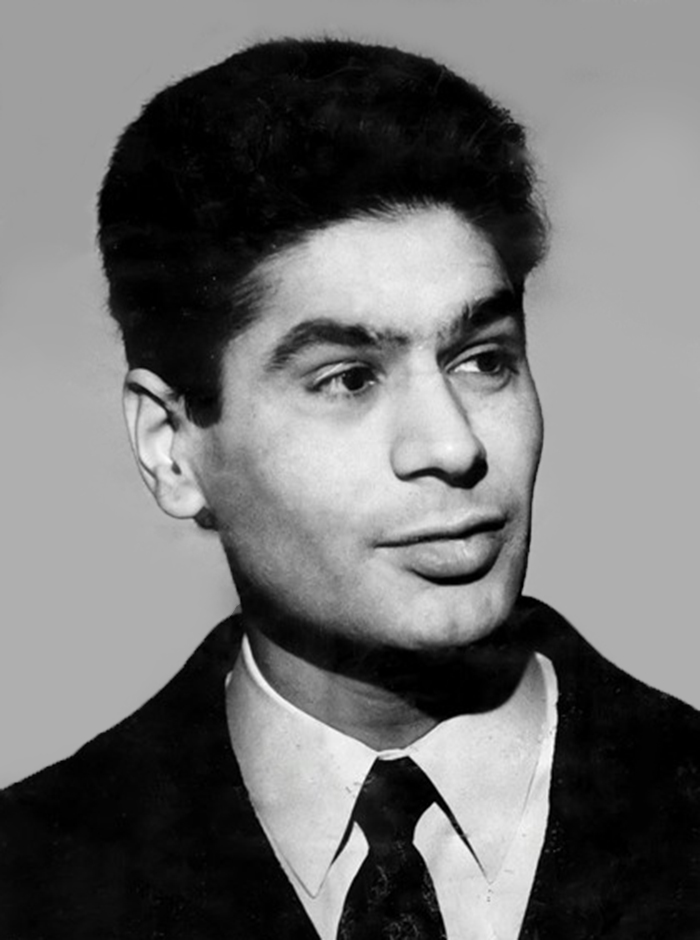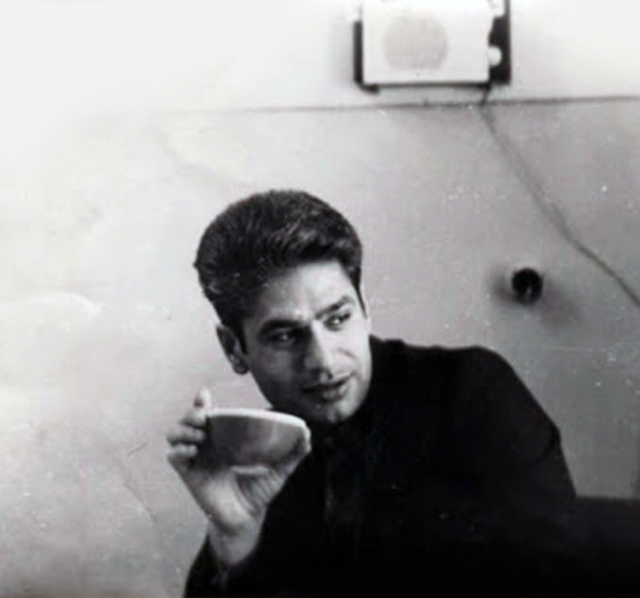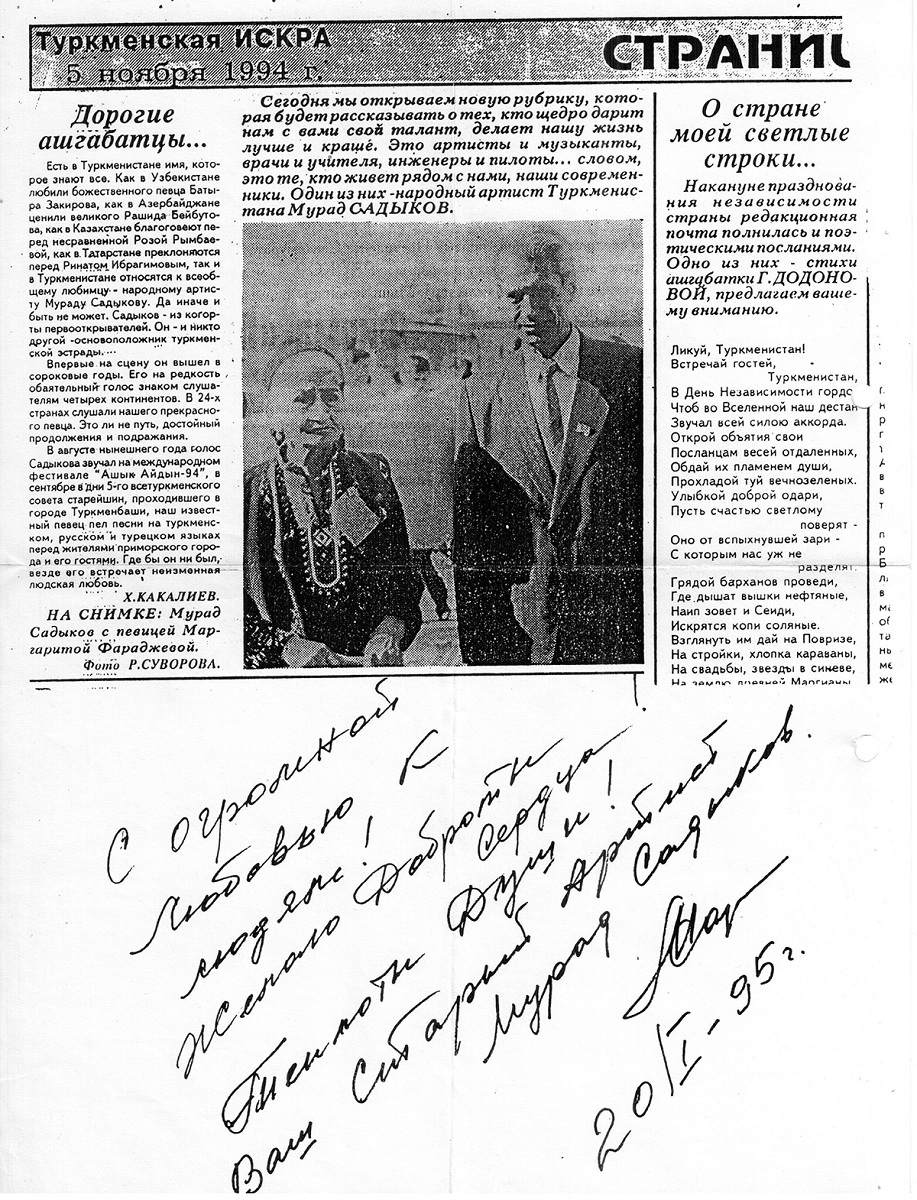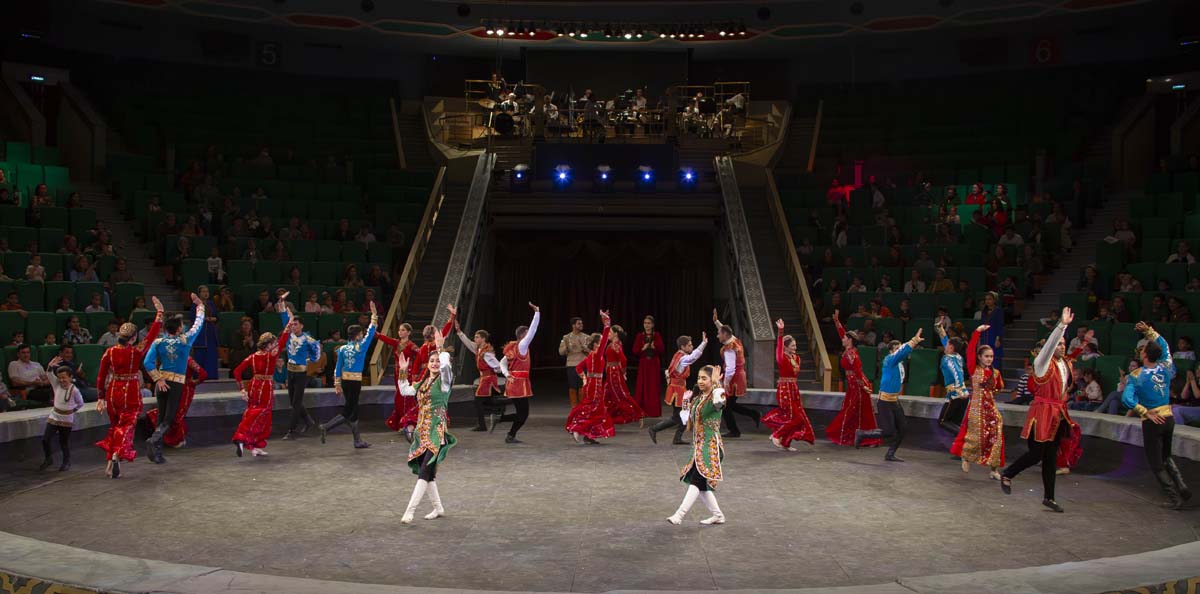The sign on the door said, “Silence, Please! Examination in Progress”. The door opened and a handsome, intelligent-looking junior researcher of the Design and Research Institute for Water Resources Development (Giprovodkhoz) appeared in front of the Admission Committee at the Turkmen State Academy of Music. The first reaction of the Committee members was to say: “You have opened the wrong door!” But the applicant pronounced his name distinctly: Murad Sadykov. The Committee members, who were very experienced, had met both amazingly talented and untalented individuals alike among applicants, as well as violinists and pianists, willing to change their career path in music and to become professional singers. However, it was the first time they had met the applicant who was a junior researcher. Murad Sadykov’s singing melted the hearts of the strict examiners at once…
Let try to imagine what Murad Sadykov might have felt at that time. Applying for admission to the Academy of Music with his professional background was a very bold step, which helped People’s Artist of Turkmenistan Murad Sadykov to get started on the path to becoming a well-known and much-loved singer at home and abroad.
The good-looking young boy began to perform in the war years when he came with his mandolin to the hospital, which had been evacuated to Ashgabat, and sang “Apple trees and pear trees went into blooming...” to wounded soldiers in his sonorous voice and fluent Russian. The soldiers smiled and cried, and requested that the boy come again. Once, a soldier, who was deeply moved by the little boy’s singing, gave him a loaf of brown bread. And a loaf of bread was sheer joy during wartime! Murad was carrying his first tangible reward home, anticipating how his happy mother would cut the bread into equal parts and would give them to his brother and two sisters. A delicious smell of the bread made the boy affected by chronic hunger even much hungrier. The boy was running the rest of the way home, fearing that he would not be able to resist the temptation.
It was singing that Murad loved most. He was perfectly aware that his voice made a significant impression on people and he found that truly fascinating. He sang in amateur performances in the orphanage where his mother had to send him because she had nothing to feed her children. When at school, he took top places in competitions. The more he sang, the more he enjoyed it. In addition to singing, he had a keen interest in technical things. This dictated his career choice: he entered then Turkmen State Agricultural Institute (presently Turkmen State Agricultural University). As a student, he participated in students’ amateur performances and attended the 1957 World Youth and Student Festival in Moscow.
After completing a degree in water engineering, Murad entered the Academy of Music (the Vocal Department, the evening division). But he continued to work in his chosen profession for seven more years, successfully combining music with science. And before his thesis defense, he was requested to choose between them. And he chose music. The young engineer made the right decision: firstly, he would become a professional singer; secondly, being part of the music scene would help him to form a pop group. Murad could not imagine his future life without it.
Like-minded individuals, such as Rishat Shafiev, Ilyas Rejepov, Shamamed Byashimov, and Hajiriza Azizov began to gather around the successful radio and television singer. Like Murad, they had a consuming passion for music. Through the efforts of the musicians, a pop ensemble called Gunesh was created in 1970. The ensemble specialized in folk songs with contemporary arrangements. It was a winning formula: the national flavor blended with new music trends captivated audiences.
Murad Sadykov’s tender voice delighted radio listeners. Back then, every family used to have a radio. And the songs sung by the singer became hits at once. Among them were songs composed by Turkmen composers Chary Nurymov, Danatar Ovezov, Aman Agajikov, and Veli Mukhatov, but presented with pop arrangements: “A Wedding Song”, “A Moonlight Night”, “You Will Be Surprised”, “My Sweetheart”, “Leila”, “A Carpet Weaver”, “A Morning Breeze”, and “A White Dove”. The song “A White Dove” was a big favorite with rural dwellers. When Gunesh turned up in rural communities and local boys saw Murad Sadykov, they shouted with joy: “The white dove has arrived!!!” The song was closely associated with the singer.
The pop group’s success attracted young musicians. And Stanislav Morozov, Vladimir Belousov, Stepan Stepanyan and Oleg Korolyov became members of the group. The 1970s saw pop ensembles grow in popularity in many Soviet republics. And Gunesh took its place among well-known pop bands such as Vesyolye Rebyata (The Jolly Fellows, Moscow), Poyushchie Gitary (The Singing Guitars, Leningrad), Pesnyary (The Singers, Minsk), Tsvety (The Flowers, Moscow), Iveria (Tbilisi), Yalla (Tashkent), and others.
Every performance by Gunesh was a long-awaited and special treat for listeners. Brilliantly performed by Murad Sadykov, Russian songs “The Song about a Mother”, “A Russian Field”, “Smuglyanka” (A Swarthy Girl), “In a Sunny Meadow”, etc., sounded truly soul-stirring. Later, the songs were part of the All-Union Radio Committee collection and were used in radio programming.
They say that when film director Leonid Bykov was looking for a singer to sing the soundtrack song “A Swarthy Girl” to the film “Only ‘Old Men’ are Going to Battle”, he listened to tapes featuring several singers whose names he did not know. When he heard Murad Sadykov’s voice, he said: “This Russian fellow sings magnificently.” When someone answered: “He is not Russian.” The director exclaimed: “It can’t be!” And the 1973 famous Soviet film that received a number of awards features the inimitable voice of Murad Sadykov.
The singer achieved fame and popularity far beyond the borders of the republic and the country. Gunesh enjoyed overwhelming success on tours to Germany, Czechoslovakia, Bulgaria, Mongolia, Canada, African countries, and Vietnam. “After our concert in the city of Ho Chi Minh, Shamamed Byashimov recollected, Murad Sadykov was awarded honorary citizenship of Ho Chi Minh, the commemorative badge and the Friendship Order at a grand ceremony. The recognition of our fellow countryman was a hymn to our native country and high praise for Turkmen national art.”
The pop group was the winner of the 1978 Music Competition in Zielona Góra (Poland), the 1980 Spring Rhythms Festival (Georgia), and the 1981 All-Union Pop Music Competition in Armenia. In 1982, Gunesh was awarded the title of “Merited Ensemble of the Turkmen Soviet Socialist Republic”. That same year, Murad Sadykov was given the honorary title of People’s Artist of Turkmenistan.
Suddenly, at the peak of its popularity, the group ceased to exist. Murad Sadykov, the leader of Gunesh, left unexpectedly and the outstanding ensemble broke up. This frequently happens to bands due to the human factor – either within them or outside. No matter what the cause was, but the ensemble broke up in the second half of the 1980s.
By the way, Sadykov had combined solo performances in collaboration with other accompanists even when he was the member of the ensemble. His singing career continued for many years after Gunesh. Murad Sadykov performed with various orchestras: symphony and pop music symphony orchestras, Ashgabat- and Moscow-based orchestras, and chamber orchestras.
In 2013, the famous singer passed away. But his wonderful voice still lives on in the hearts of the people of Turkmenistan. In accordance with a Decree issued by President of Turkmenistan Gurbanguly Berdimuhamedov, Murad Sadykov was posthumously awarded the Watana Bolan Söýgüsi Üçin Medal in 2016. The singer’s contributions to Turkmen pop music have been rightly recognized by his fellow countrymen.
Tamara GLAZUNOVA









